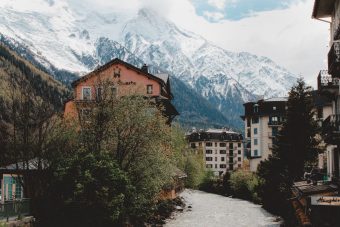Italian authorities have closed off roads and evacuated homes after experts warned that a portion of a Mont Blanc glacier is at risk of collapse.

Stefano Miserocchi, the mayor of the town of Courmayeur, said “public safety is a priority” after experts from the Fondazione Montagna Sicura (Safe Mountains Foundation) in the Aosta Valley said up to 250,000 cubic metres of ice was in danger of sliding off the Planpincieux glacier on the Grandes Jorasses peak.
“This phenomenon once again testifies that the mountain is in a phase of strong change due to climatic factors, therefore it is particularly vulnerable,” Miserocchi said in a statement.
Experts have been monitoring the glacier closely since 2013 to detect the speed at which the ice is melting, and Miserocchi said the rate had “significantly increased” recently. But they are unable to predict when the ice would break away.
“There are currently no empirical models or methods that can enable quantitative predictions in the case of glaciers with sliding dynamics such as Planpincieux,” Miserocchi added.
The warning comes as world leaders meet in New York for the UN climate action summit. The Italian prime minister, Giuseppe Conte, said: “The news that part of Mont Blanc risks collapsing is a warning that should not leave us indifferent. It must shake us all and force us to mobilise.”
In 2017, about 50 cubic metres of ice fell from Planpincieux, while in September last year a mass of ice broke away from the Glacier de la Charpoua, on the south-east side of the Aiguille Verte, on the French side of Mont Blanc.
Miserocchi’s order came into force on Tuesday and includes the evacuation of homes and mountain refuges in the area. He said it was a precautionary measure and there was no threat to residential areas or tourist establishments. The zones affected are in the area of Val Ferret.
Rising temperatures are causing glaciers to melt, with environmental activists in Switzerland holding their second “mourning ceremony” on the evaporating Pizol glacier in the country’s Glarus Alps on Monday. The glacier has lost up to 90% of its volume since 2006. In August, a similar event was held at a glacier in Iceland.
A heatwave across Europe this summer is also said to have accelerated the melt speed.
Source: Guardian



